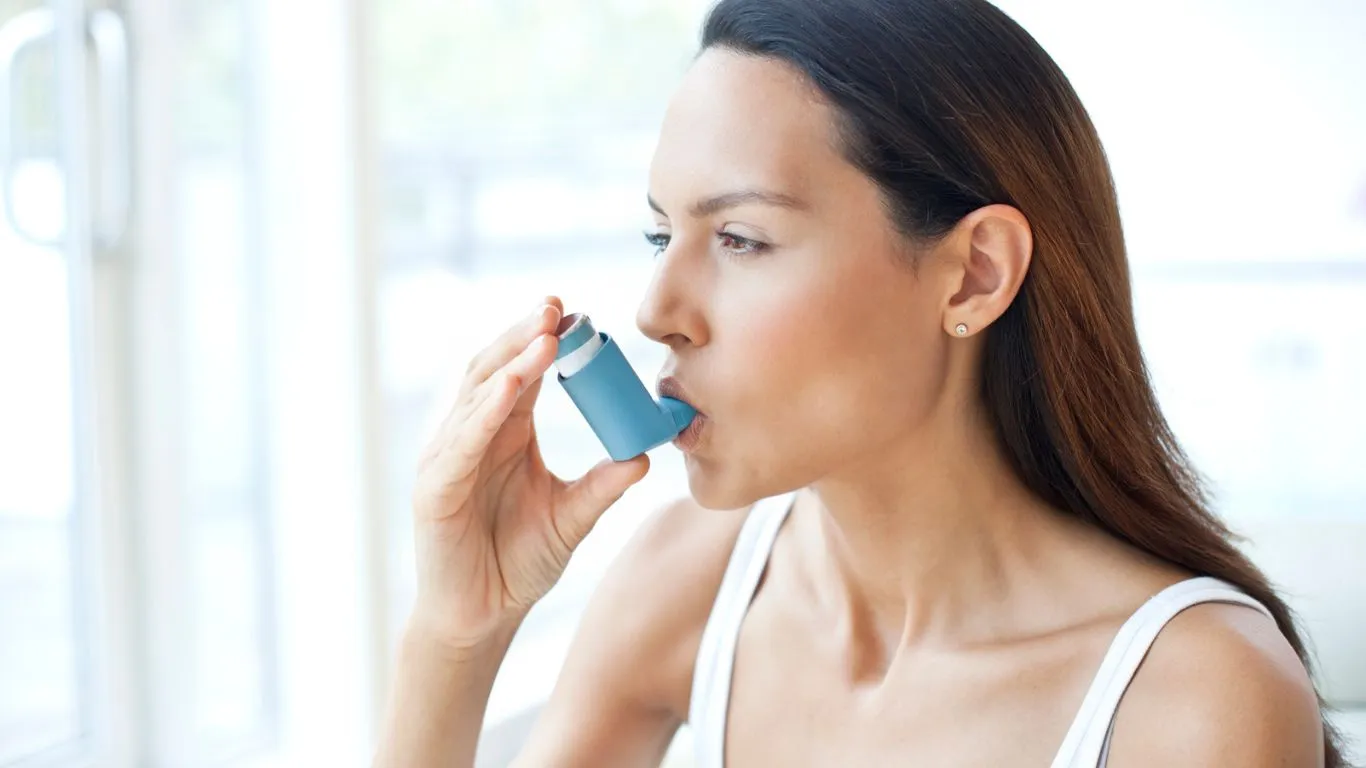Can Asthma Get Worse in Menopause? Surprising Truth Women Should Know
Can asthma get worse in menopause? It’s a question I hear surprisingly often, especially from women who’ve lived with asthma for years without major issues—until midlife hits. As a pulmonary nurse practitioner who’s worked with hundreds of asthma patients over the years, I can tell you that menopause can throw quite a curveball at your respiratory health. It’s one of those topics that doesn’t get enough spotlight, even though so many women are quietly struggling through it, chalking up their worsening symptoms to “just getting older.” But the connection is real—and yes, your asthma *can* get worse during and after menopause.
How Menopause Changes the Game for Asthma

Hormones & Airways: What’s Really Happening?
Let’s start with the hormone rollercoaster. Estrogen and progesterone aren’t just about reproduction—they actually play a role in inflammation and immune function. When these hormone levels start fluctuating (and eventually dropping) during perimenopause and menopause, they can trigger a cascade of effects on your lungs and airways.
One of my long-time patients, a 52-year-old woman who had mild asthma since childhood, suddenly began experiencing nighttime wheezing and daily shortness of breath. Nothing had changed—no new allergens, no infections—but her asthma was acting up like never before. Bloodwork confirmed she was postmenopausal. Coincidence? Not likely.
Menopause doesn’t cause asthma, but it can definitely make existing asthma harder to control. That’s something many people, even healthcare providers, overlook.
What the Research Says
Clinical studies have backed up what many of us see in practice. Women over 50 are more likely to be hospitalized for asthma than men of the same age, and there’s growing evidence linking hormonal changes to worsening respiratory symptoms.
- Lower estrogen levels may increase inflammation in the lungs.
- Progesterone fluctuations can lead to airway hyperresponsiveness.
- Hormonal therapy may improve—or worsen—symptoms, depending on the individual.
I often tell patients that asthma during menopause can feel like a moving target. What worked before might not cut it anymore. Inhalers that used to offer instant relief might seem less effective, or symptoms might become more unpredictable. Sound familiar?
Real-Life Signs Your Asthma Is Being Affected by Menopause

Spotting the Shift Early
Most women don’t immediately link their hormonal changes to their asthma. After all, menopause brings so many different symptoms—hot flashes, mood swings, insomnia—that breathing issues may not register as part of the same picture. But being aware can help you catch it early and adjust your care plan before things spiral.
Some red flags to watch for:
- Sudden increase in asthma attacks or rescue inhaler use
- More frequent nighttime symptoms
- Feeling winded with normal activity
- More sensitivity to triggers like cold air or allergens
For me, one of the clearest patterns I see is an uptick in “silent symptoms”—that low-level chest tightness or persistent cough that women often ignore because it’s not a full-blown attack. But when I dig into their history and we connect the dots, menopause often plays a starring role.
Don’t Let It Go Untreated
If you notice these changes, don’t wait until your symptoms become unmanageable. Asthma can be sneaky like that. It’s better to check in with a pulmonary specialist or even your primary provider to re-evaluate your treatment plan.
And yes, you may need to switch up your meds. I’ve had patients who needed to step up to combination inhalers during menopause, or adjust their allergy management routines to keep everything under control.
Why Some Women Are Hit Harder Than Others

Genetics, History, and More
Here’s where it gets a bit more complex. Not all women experience a worsening of asthma in menopause. Some actually report improvements (though that’s the minority in my experience). So what makes the difference?
Several factors can influence how menopause affects your asthma:
- Family history of asthma or allergies
- History of hormone-sensitive conditions like migraines or endometriosis
- Obesity or metabolic issues, which can worsen inflammation
- Smoking history—even if you quit long ago
I’ve seen plenty of women with no asthma history start showing symptoms for the first time around menopause, only to later discover a genetic predisposition that had been dormant. In other words, menopause can be the trigger that finally flips the switch.
Managing Asthma During Menopause: What Actually Works?

Time to Rethink Your Treatment Plan
Once I recognize a pattern in a patient—like more frequent flares or poor sleep due to nighttime wheezing—I usually revisit their whole asthma management plan. Menopause isn’t just a hormonal transition; it’s a whole-body shift. And what worked in your 30s or 40s may not cut it now.
From personal experience in clinic, many women benefit from a more proactive approach. It’s not just about treating symptoms anymore—it’s about preventing them from escalating in the first place. Here’s what I often adjust or explore:
- Upgrading inhalers: Moving from a basic bronchodilator to a combo inhaler with a steroid can make a huge difference.
- Daily symptom tracking: Logging symptoms can reveal patterns tied to hormonal shifts, sleep, or stress.
- Trigger audit: Even long-time asthma patients sometimes overlook changes in their environment, like a new pet, dusty attic, or new detergent.
And I always stress the importance of speaking up. If you feel like your meds aren’t working as well, say something. Asthma control during menopause is 100% achievable—but not if you’re stuck on a treatment plan that doesn’t evolve with your body.
Monitoring Lung Function More Frequently
During menopause, I often recommend more frequent spirometry or peak flow readings. The fluctuations can be subtle, and patients don’t always notice until they’re in full-blown flare mode.
One of my patients, Carol, had near-perfect asthma control for over a decade. Then out of nowhere, she had three ER visits in one year. Once we started doing monthly spirometry checks, we noticed her FEV1 was dropping by 10–15% before her symptoms even kicked in. That gave us the early warning system we needed to tweak her meds and keep her out of the hospital.
What About Hormone Replacement Therapy (HRT)?

The HRT Dilemma for Asthma Patients
This is where things get tricky. I get asked all the time—“Will HRT help or hurt my asthma?” And the honest answer is: it depends. For some women, hormone replacement therapy (especially estrogen) can stabilize their respiratory symptoms. For others, it may increase inflammation or trigger flares.
Here’s what I usually consider before giving any advice:
- Severity and frequency of asthma symptoms
- History of hormone sensitivity (PMS, migraines, etc.)
- Type of HRT (oral, patch, combination therapy)
- Presence of other conditions like high blood pressure or clotting disorders
One of my patients had debilitating hot flashes and her asthma was out of control. Once she started on a low-dose estrogen patch, her sleep improved, her mood stabilized, and her asthma became easier to manage. Another patient had the opposite reaction—estrogen triggered tightness in her chest within weeks. So yeah, it’s not one-size-fits-all.
Talk to a Specialist—Not Just Your OB-GYN
This is so important. While your OB-GYN may know a ton about managing menopause, they might not connect the dots when it comes to asthma. That’s where your pulmonologist or asthma specialist comes in. I often collaborate with gynecologists to make sure our patients aren’t being over- or under-treated when it comes to their respiratory health.
Lifestyle Hacks That Actually Help

It’s Not Just About the Inhaler
I always tell my patients that meds are only one piece of the puzzle. Menopause is a great time to reassess the whole picture—what you eat, how you sleep, how you move your body, and how you manage stress all matter more than ever. Here are some lifestyle strategies I’ve seen work wonders:
- Anti-inflammatory diet: Think omega-3s, leafy greens, and turmeric. Cut down on sugar and processed foods.
- Gentle exercise: Walking, yoga, or swimming can improve lung function without overexerting your system.
- Mind-body practices: Deep breathing, mindfulness, and even acupuncture can help manage both menopause and asthma symptoms.
- Sleep hygiene: Poor sleep increases inflammation and weakens immunity. Menopause already messes with your sleep, so prioritize this!
In my own practice, I’ve seen women cut down on flare-ups just by reducing stress. Cortisol (your stress hormone) and inflammation are deeply connected—and yes, chronic stress can amplify asthma symptoms. Menopause is stressful enough. We don’t need asthma piling on!
Supplements Worth Exploring
Now, I’m not big on pushing supplements for everyone. But in menopause, there are a few that *might* help stabilize your system—especially if your diet isn’t covering all the bases:
- Vitamin D: Low levels are linked to worse asthma control and poor immune response.
- Magnesium: Helps with bronchial relaxation and can support better sleep and mood.
- Omega-3 fatty acids: These have natural anti-inflammatory properties that benefit both lungs and joints.
As always, talk to your provider before starting anything new. I’ve seen a few patients jump into heavy supplement routines thinking it’ll fix everything—and end up with more issues than they started with. The goal is support, not overload.
Why You Shouldn’t Just “Tough It Out”
I’ll be real for a minute. Too many women brush off their worsening asthma symptoms because they’re already juggling a million things—kids leaving home, aging parents, career changes, or just dealing with the chaos that menopause brings. They think it’s just part of getting older. But it’s not.
Your breathing matters. Feeling like you’re gasping for air isn’t something to normalize or push through. If you’ve noticed that your asthma feels different—or worse—since menopause began, trust your instincts. Your body’s trying to tell you something, and it deserves your full attention.
Creating a Personalized Asthma Action Plan After Menopause

Why One-Size-Fits-All Doesn’t Work
If there’s one thing I’ve learned after years in pulmonary care, it’s this—no two asthma cases are alike, and that becomes even more true once menopause enters the picture. What worked for one woman in her 30s or 40s might not cut it anymore at 55. And honestly, the key to controlling asthma post-menopause is building a personalized game plan that adapts to your body’s new rhythm.
Think of it like this: your hormones, immune system, lung sensitivity, sleep quality, and stress levels are all changing. If your asthma plan hasn’t been updated in five years (or longer), it’s time. Here’s what I usually recommend we look at together:
- Reassess baseline lung function – Schedule updated spirometry or peak flow tests to track any subtle changes.
- Evaluate current medications – You may need different doses or delivery methods, like a nebulizer or dual-action inhalers.
- Review triggers again – What used to be mild may now send you into a flare. Hormones can change sensitivity to allergens and irritants.
- Update your written asthma action plan – Make sure it reflects current symptoms, peak flow zones, and emergency instructions.
One of my postmenopausal patients recently moved into a home with a wood-burning fireplace, and didn’t realize the smoke was quietly triggering her asthma until we tracked her peak flow scores. It’s the little changes that can make a big difference.
The Overlooked Link Between Allergies and Menopause-Triggered Asthma

New Allergies? Yes, It Can Happen
This surprises people, but yes—some women actually develop new allergies around menopause. Others find that their existing allergies worsen, which then leads to increased asthma symptoms. The immune system doesn’t work quite the same after hormone levels drop, and for some, this can trigger immune dysregulation or heightened reactivity.
I remember a patient who suddenly couldn’t walk through her neighborhood in spring without coughing fits. We tested her and, lo and behold, a new tree pollen allergy had emerged in her mid-50s. That allergy then triggered a chain reaction with her asthma. With some antihistamine tweaks and nasal sprays, we got it under control, but it took some digging to connect the dots.
How to Get Tested & What to Watch For
If you suspect allergies are making your asthma worse, ask your provider about a referral for allergy testing—either skin prick or blood-based (IgE). Even if you’ve been tested before, new results can offer insight.
Watch for these common signs:
- Asthma symptoms that coincide with seasons or specific locations
- Itchy eyes, runny nose, or sneezing that seem new
- More chest tightness after cleaning, pet exposure, or gardening
For more allergy-specific resources, sites like PetMD or NIH offer updated info on environmental allergens and treatment options.
Long-Term Asthma Wellness After Menopause
Looking Ahead: It’s About More Than Control
Let’s be honest: managing asthma after menopause isn’t just about putting out fires. It’s about long-term wellness. As you age, your lung tissue naturally becomes less elastic, which can reduce overall capacity—even without asthma. If you add uncontrolled asthma into the mix, it can impact your quality of life in a big way.
So what can you do to maintain strong respiratory health over the next 10, 20, or even 30 years?
- Stay physically active – Movement keeps your lungs working efficiently. It doesn’t have to be intense—just consistent.
- Keep weight in check – Extra weight can worsen asthma symptoms and increase the risk of sleep apnea.
- Get vaccinated – Respiratory infections are more dangerous with asthma. Stay up to date with flu, COVID, and pneumonia vaccines.
- Continue regular lung monitoring – Don’t skip those follow-ups. Annual or biannual check-ins help catch subtle declines.
Even breathing exercises, like diaphragmatic breathing or pursed-lip breathing, can improve how you use your lungs day to day. I teach these in clinic often—sometimes they do more good than a new medication, especially for women who have stress-related flares.
Support Matters, Too
You’re not alone in this. Menopause plus asthma can feel isolating, especially when people around you don’t really “get” what’s happening. I encourage women to join support groups or online communities where they can share experiences, swap tips, and advocate for their health without judgment. It’s powerful, and it really does make a difference in how well you stick with your care plan.
Useful Resources & Tools
- NIH – Research-backed info on asthma and women’s health
- Health.com – Accessible articles on managing menopause and chronic conditions
- Mayo Clinic – Guides on HRT, asthma medications, and lifestyle tips
Disclaimer
This article is based on my clinical experience and current research but is not a substitute for professional medical advice. Always consult your healthcare provider for personal guidance on your asthma and menopausal symptoms. Everyone’s experience is unique, and treatment plans should be tailored to individual needs.

Bianca Nala is a compassionate Nurse Practitioner with a strong background in primary and respiratory care. As a health writer for Healthusias.com, she combines her clinical expertise with a talent for clear, relatable storytelling to help readers better understand their health. Bianca focuses on topics like asthma, COPD, chronic cough, and overall lung health, aiming to simplify complex medical topics without losing accuracy. Whether she’s treating patients or writing articles, Bianca is driven by a single goal: making quality healthcare knowledge accessible to everyone.







